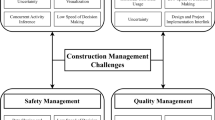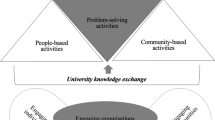Abstract
In today’s emerging knowledge-based economy, Knowledge Management (KM) is being rapidly disseminated in both academic circles and the business world. The effective management of knowledge is vital to the survival and prosperity of a company, particularly in project-based industries such as construction. As a result, construction companies have adopted Information Technology (IT)-based KM systems (KMSs). KMS refers to the technology platform and infrastructure that an organization employs to support KM. However, the increasing attention given to KM is targeted at Large Multi-national Construction companies (LMCs), with little attention given to Small and Medium-sized Construction companies (SMCs). Compared to LMCs, SMCs need different sources and types of knowledge and technology to remain nourished and healthy. In this context, this research attempts to facilitate KM activities within SMCs through the distribution of a set of KM technologies tailored to meet the requirements of SMCs. First, we analyze key obstacles to implement KM activities within SMCs through a survey. Based on this analysis, a set of KM technologies are then identified and adapted to support the KM activities of SMCs in a feasible fashion. In addition, we discuss the expected change of organizational behavior by the distribution of those KM technologies. In the end, these technologies are synthesized into a web-based Construction Knowledge Management Portal (CKMP) system that seeks the inter-organizational sharing of construction knowledge. By delivering key KM technologies to SMCs, our study benefits both academia and the construction industry.
Similar content being viewed by others
References
Alavi, M. (1997). KPMG Peat marwick U.S.: One giant brain, Case 9-397-108, Boston, MA: Harvard Business School.
Alavi, M and Leidner, D. E. (2001). “Review: Knowledge management and knowledge management systems: Conceptual foundations and research issues.” MIS Quarterly, Vol. 25, No. 1, pp. 107–136.
Alazmi, M. and Zairi, M. (2003). “Knowledge management critical success factors.” Total Quality Management, Vol. 14, No. 2, pp. 199–204
Al-Ghassani, A. M., Kamara, J. M., Anumba, C. J., and Carrillo, P. M. (2006). “Prototype system for knowledge problem definition.” Journal of Construction and Engineering and Management, Vol. 132, No. 5, pp. 516–524.
Bartlett, C. (1996). Managing knowledge and learning, Case 9-396-357, McKinsey & Company, Boston, MA, Harvard Business School.
Benbya, H., Rassiante, G., and Belbaly, N. A. (2004). “Corporate portal: A tool for knowledge management synchronization.” International Journal of Information Management, Vol. 24, No. 3, pp. 201–220.
Boyd, D., Egbu, C., Chinyio, E., Xiao, H., and Lee, C. C. T. (2004). “Audio diary and debriefing for knowledge management in SMEs.” In ARCOM 20th Annual Conference, Khosrowshahi, F. (ed.), U.K., pp. 741–747
Carrillo, P. M., Anumba, C. J., and Kamara, J. M. (2000). “Knowledge management strategy for construction: Key IT and contextual issues.” Proc., CIT 2000, Gudnason, G. (ed.), Reykjavik, Iceland, pp. 155–162.
Carrillo, P. M. and Chinowsky, P. (2006). “Exploiting knowledge management: The engineering and construction perspective.” Journal of Management and Engineering, Vol. 22, No. 1, pp. 2–10.
Carrillo, P. M., Robinson, H., Al-Ghassani, A., and Anumba, C. J. (2004). “Knowledge management in UK construction: Strategies, resources and barriers.” Project Management Journal, Vol. 35, NO. 1, pp. 46–56.
Cheshire, C. and Antin, J., (2008). “The social psychological effects of feedback on the production of internet information pools.” Journal of Computer-Mediated Communication, Vol. 13, No. 3, pp. 705–727.
Chinowsky, P. S. and Molenaar, K. R. (2005). Leadership in a knowledge era: Achieving a learning organization, Research Summary 201-1, Construction Industry Institute, Austin, TX.
Demian, P. and Frutcher, R. (2006). “Methodology for usability evaluation of corporate memory design reuse systems.” Journal of Computing in Civil Engineering, Vol. 20, No. 4, pp. 377–389.
Egbu, C. O. and Robinson, H. S. (2005). Construction as a knowledge based industry, Knowledge Management in Construction, Blackwell publishing, Oxford, U.K., pp. 31–49.
El-Diraby, T. A., Lima, C., and Feis, B. (2005). “Domain taxonomy for construction concepts: Toward a formal ontology for construction knowledge.” Journal of Computing in Civil Engineering, Vol. 19, No. 4, pp. 394–406.
Fong, P. S. W. and Wong, K. (2005). “Capturing and reusing building maintenance knowledge: A sociotechnical perspective.” Knowledge Management in the Construction Industry: A Sociotechnical Perspective, Idea Group Publishing, Hershey, Pa., pp. 67–89.
Gartner Group (1998). “Knowledge management scenario.” Conference Presentation, Stamford, CN, Presentation Label SYM8KnowMan 1098Kharris.
Geo NT (2004). The presentation material for introduction of Knowledge Document Management System (KDMS), GeoNT, Korea.
Ghobadian, A. and Gallear, D. (1996). “Total quality management in SMEs.” OMEGA, Vol. 24, No. 1, pp. 83–100.
Gruber, T. R. (1993). “A translation approach to portable ontology specifications.” International Journal of Knowledge Acquisition for Knowledge-based Systems, Vol. 5, No. 2, pp. 199–220.
Guarino, N. and Welty, C. (2000) “Towards a methodology for ontology-based model engineering.” Proc., IWME-2000-International Workshop on Model Engineering, Sophia Antipolis and Cannes, France.
Hagek, J. and Brown, J. S. (2001). “Your next IT strategy.” Harvard Business Review, Vol. 79, No. 9, pp. 105–115.
Hansen, M. T., Nohria, N., and Tierney, T. (1999). “What is your strategy for managing knowledge?.” Harvard Business Review, Vol. 77, No. 2, pp. 106–116.
Herman, J. (2003). “Blogs for business.” Business Communications Review, Vol. 33, No. 4, pp. 20–22.
Ives, B. and Watlington, A. (2005). “Using blogs for personal KM and community building.” Knowledge Management Review, Vol. 8, No. 3, pp. 12–15.
Jeffcoate, J., Chappell, C., and Feindt, S. (2000). “Attitudes towards process improvement among SMEs involved in e-commerce.” Knowledge and Process Management, Vol. 7, No. 3, pp. 187–195.
Kazi, A. S. and Koivuniemi, A. (2006). “Sharing through social interaction.” The Case of YIT Construction Ltd., Real-life Knowledge Management: Lessons from the Field, KnowledgeBoard, Finland, pp. 63–81.
Kivrak, S., Arslan, G., Dikmen, I., and Birgonul T. (2008). “Capturing knowledge in construction projects: Knowledge platform for contractors.” Journal of Management in Engineering, Vol. 24, No. 2, pp. 87–95.
KPMG (1998). Knowledge management research report, KPMG Management Consulting, U.K.
Lee, K. W. (2010). Ontology-based construction knowledge retrieval system, Master’s Dissertation, Department of Architecture, Seoul National University.
Lee, T. S., Lee, D. W., and Park, S. J. (2003). “Establishment of knowledge management strategies for small & medium-sized general and special construction companies.” Proceedings of the Forth KICEM Annual Conference, KICEM, pp. 602–605.
Lourenço, R. P. (2008). “A bliki model to support political discourse formation.” WikiSym’ 08 Proceeding of the 4th International Symposium on Wikis, Porto, Portugal: ACM.
Mezher, T., Abdul-Malak, M. A., Ghosn, I., and Ajam, M. (2005). “Knowledge management in mechanical and industrial engineering consulting: A case study.” Journal of Management and Engineering, Vol. 21, No. 3, pp. 138–147
Mills, T. (2007). “Wiki-based construction knowledge sharing.” The ASC Annual Conference, Associated Schools of Construction, Flagstaff, Arizona.
Nitithamyoun, P. and Skibniewski, M. J. (2004). “Web-based construction project management systems: How to make them successful?” Automation in Construction, Vol. 13, No. 4, pp. 491–506.
Nonaka, I. and Takeuchi, H. (1995). The knowledge-creating company, Oxford University Press, New York.
OCCS Development Committee (2006). Omniclass, http://www.omniclass.org.
Park, M., Lee, H. S., and Kwon, S. (2010). “Construction knowledge evaluation using expert index.” Journal of Civil Engineering and Management, Vol. 16, No. 3, pp. 401–411.
Patel, M. B., McCarthy, T. J., Morris, P. W. G., and Elhag, T. M. S. (1999). The role of IT in capturing and managing knowledge for organizational learning on construction projects, Univ. of Manchester Institute of Science and Technology.
Pentland, B. T. (1995). “Information systems and organizational learning: The social epistemology of organizational knowledge systems.” Accounting Management and Information Technologies Vol. 5, No. 1, pp. 1–21.
Rahman, S. (2001). “A comparative study of TQM practice and organizational performance of SMEs with and without ISO 9000 certification.” International Journal of Quality & Reliability Management, Vol. 18, No. 1, pp. 35–49.
Reed, F. M., Walsh, K., and Grice, R. (2001). “Supporting the information needs of small manufacturing firms.” Paper Presented at 25th ISBA National Small Firms Policy and Research Conference, Competing Perspectives of Small Business and Entrepreneurship.
Robinson, H. S., Carrillo, P. M, Anumba, C. J., and Al-Ghassani, A. M. (2001). “Linking knowledge management to business performance in construction organizations.” Proceedings of ARCOM 2001 Conference, Salford, United Kingdom, 5–7 September, pp. 577–586.
Sensiper, S. (1997). AMS knowledge centers case, Case N9-697-068, Boston: Harvard Business School.
Sexton, M. and Barret, P. (2003). “Appropriate innovation in small construction firms.” Construction Management and Economics, Vol. 21, No. 6, pp. 623–633.
Shelbourn, M. A., Bouchlaghem, D. M., Anumba, C. J., Carrillo, P. M., Khalfan, M. M. K., and Class, J. (2006). “Managing knowledge in the context of sustainable construction.” Electron J. Inf. Technol. Constr., Vol. 11, pp. 57–71.
Tan, H. C., Carrillo, P., Anumba, C., Kamara, J. M., Bouchlaghem, D. and Udeaja, C. (2006). “Live capture and reuse of project knowledge in construction organizations.” Knowledge Management Research & Practice, Vol. 2006, No. 4, pp. 149–159.
Thorpe, T. and Mead, S. (2001). “Project-specific web sites: Friend or Foe?” Journal of Construction Engineering and Management, Vol. 127, No. 5, pp. 406–413.
Tiwana, A. (2000). The knowledge management toolkit-Practical techniques for building a knowledge management system, Prentice-Hall, Englewood Cliffs, N.J.
Webb, S. P. (1998). Knowledge management: Linchpin of change, Association for Information Management, London.
Wehlton, M., Ballard, G., and Tommelein, I. D. (2002). “A knowledge management framework for project definition.” Electron J. Inf. Technol. Constr., Vol. 7, pp. 197–212.
Werbach, K. (2001). Triumph of the weblogs, Eadventure, June 18, 2001 (Retrieved December 11, 2001).
Author information
Authors and Affiliations
Corresponding author
Rights and permissions
About this article
Cite this article
Park, M., Jang, Y., Lee, HS. et al. Application of knowledge management technologies in Korean small and medium-sized construction companies. KSCE J Civ Eng 17, 22–32 (2013). https://doi.org/10.1007/s12205-013-1607-z
Received:
Revised:
Accepted:
Published:
Issue Date:
DOI: https://doi.org/10.1007/s12205-013-1607-z




